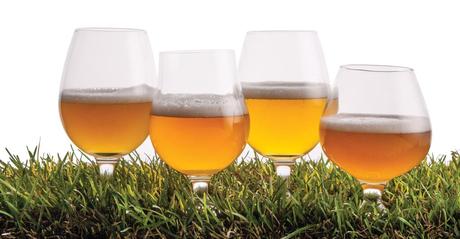Beer has been a beloved beverage throughout human history, but few styles carry as much historical significance as Belgian Saison. Originating from the rustic farmlands of Wallonia, in southern Belgium, this unique brew has a captivating story that intertwines with the region’s agricultural heritage and the quest for refreshment.

To truly understand the roots of Saison beer, we must travel back in time to the late 18th century, when the industrial revolution was reshaping Europe. In Wallonia, a predominantly agricultural region, the local farmers faced a challenge: how to quench their thirst during the scorching summer months.
The answer came in the form of Saison beer. The word “saison” translates to “season” in French, a fitting name for a beer that was brewed seasonally. During the cooler months, farmers would make large batches of Saison beer to ensure a steady supply for the coming summer.
Saison beer was brewed using ingredients readily available on the farm. Local grains, such as barley and wheat, formed the base, while locally grown hops provided bitterness and aroma. The water used in brewing came from the region’s wells, contributing to the unique character of the beer. It was a true reflection of the terroir—the combination of soil, climate, and agriculture—of the Wallonian countryside.
The brewing process itself was a collaborative effort among the farming community. As the hot season approached, farmers would gather at a central location, often a communal brewhouse, to pool their resources and knowledge. Each farm contributed its grains, and the brewers worked together to create a beer that would quench their collective thirst.
Saison beer was known for its distinct qualities. It was light in body, effervescent, and highly attenuated, meaning that most of the sugars had been converted into alcohol during fermentation. This resulted in a dry and crisp beer, which was both refreshing and satisfying. The use of local yeast strains, often wild or mixed with commercial varieties, gave Saison beer its characteristic spicy and fruity flavors.
In addition to its taste, Saison beer played a significant role in the social fabric of the farming communities. It was a beverage that brought people together, fostering camaraderie and celebration. Festivals and gatherings were often centered around the consumption of Saison beer, where stories were shared, songs were sung, and traditions were passed down from generation to generation.
The rise of industrialization in the 19th century brought significant changes to the beer industry, including the decline of Saison beer. Large-scale breweries and advances in refrigeration allowed for the production of more consistent, year-round beers. The farmhouse breweries struggled to compete with the efficiency and convenience offered by these new technologies.
However, Saison beer refused to disappear entirely. Its survival can be attributed to a few dedicated breweries and passionate brewers who recognized its historical and cultural importance. Brasserie Dupont, founded in 1844, played a crucial role in preserving and reviving the Saison tradition. Through their unwavering commitment to quality and tradition, they ensured that Saison beer remained an integral part of Belgian brewing heritage.
In recent years, Saison beer has experienced a remarkable resurgence. Craft beer enthusiasts, both in Belgium and around the world, have embraced the style’s unique characteristics and historical significance. Microbreweries and homebrewers are experimenting with different yeast strains, adding creative twists to the traditional recipe.
Today, Belgian Saison beer stands as a testament to the rich history and cultural heritage of Wallonia. It embodies the spirit of collaboration, terroir, and the pursuit of refreshment in the face of adversity. It is a reminder of the resilience of traditional brewing methods and the enduring connection between beer and community.
The next time you raise a glass of Saison, take a moment to appreciate the centuries of tradition and craftsmanship that went into its creation. As you savor its flavors and feel the effervescence dance on your palate, remember that you are tasting a piece of history—a drink that has withstood the test of time and continues to captivate beer lovers with its rustic charm.
